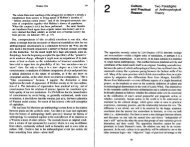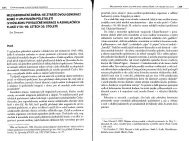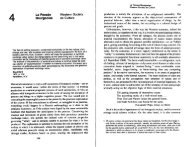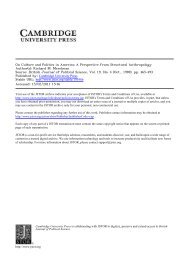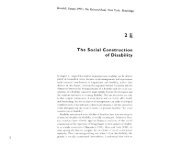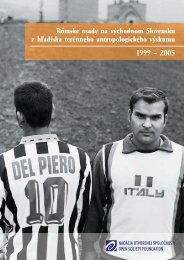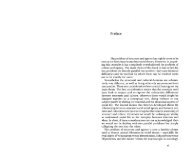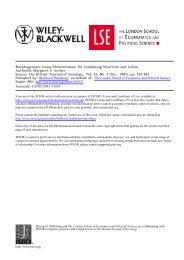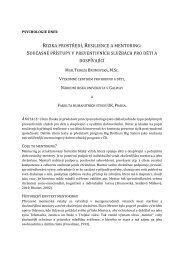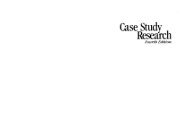Understanding Harry Potter: Parallels to the Deaf World - Moodle
Understanding Harry Potter: Parallels to the Deaf World - Moodle
Understanding Harry Potter: Parallels to the Deaf World - Moodle
You also want an ePaper? Increase the reach of your titles
YUMPU automatically turns print PDFs into web optimized ePapers that Google loves.
Endnotes 447<br />
<strong>the</strong>m academics and about life. At Hogwarts, Professor<br />
Dumbledore supported <strong>Harry</strong> in much <strong>the</strong> same way,<br />
for example, <strong>Harry</strong> says, ‘‘...instead of s<strong>to</strong>pping us, he<br />
just taught us enough <strong>to</strong> help’’ (Rowling, 1997). This<br />
philosophy allows children <strong>to</strong> make mistakes while being<br />
instructed and guided as opposed <strong>to</strong> overprotected<br />
and, as a result, with limited opportunities <strong>to</strong> learn.<br />
There is a special value in being taught by o<strong>the</strong>r qualified<br />
wizards and <strong>Deaf</strong> teachers, and children realize<br />
this early on. The same issue is, of course, important<br />
<strong>to</strong> Black, Latino, and o<strong>the</strong>r minority children.<br />
However, learning about o<strong>the</strong>r worlds is also important.<br />
Some wizards are fascinated with muggles and<br />
<strong>the</strong>ir technology, which <strong>the</strong>y find baffling. Mr. Weasley<br />
(<strong>Harry</strong>’s best friend Ron’s fa<strong>the</strong>r) is constantly collecting<br />
and marveling at <strong>the</strong> strange devices muggles use<br />
(telephones, cars, parking meters, etc.). This parallels<br />
some DCDP’s fascination with devices and technology<br />
for ‘‘hearing things’’ (radios, walkmans, phones, etc.).<br />
Similarly, in <strong>the</strong> Wizard, <strong>Deaf</strong>, and minority<br />
worlds, effective understanding of both cultures has<br />
advantages. It is critical that those teaching deaf children<br />
promote understanding and awareness of both<br />
majority and minority cultures. There are many advantages<br />
<strong>to</strong> being bilingual/bicultural and an effective<br />
social agent in both worlds.<br />
For example, <strong>Harry</strong> <strong>Potter</strong> does not know who he<br />
is. He arrives at Hogwarts <strong>to</strong> find that he is a hero in<br />
<strong>the</strong> Wizard <strong>World</strong>, after living as a ‘‘nobody’’ in <strong>the</strong><br />
muggles world. This parallels <strong>the</strong> different status<br />
given <strong>to</strong> people depending on <strong>the</strong> ‘‘center’’ (hearing,<br />
deaf, wizard, and muggle) by which <strong>the</strong>y are judged.<br />
<strong>Harry</strong> was also forbidden <strong>to</strong> ask questions about his<br />
childhood and was shielded from learning anything<br />
about his actual his<strong>to</strong>ry and gifts. The denial and lack<br />
of information given <strong>to</strong> deaf children about <strong>the</strong>ir own<br />
language, his<strong>to</strong>ry, and culture is also a significant issue.<br />
Even after he learned <strong>the</strong> truth about his parents and<br />
his own wizardry, <strong>Harry</strong> was forbidden <strong>to</strong> acknowledge<br />
and discuss <strong>the</strong>m. This is also true for many DCHP.<br />
The Mirror of Erised is an enchanted mirror that<br />
shows wizards <strong>the</strong>ir most sincere desires ra<strong>the</strong>r than<br />
<strong>the</strong>ir true reflections. All <strong>to</strong>o often, deaf people feel<br />
that <strong>the</strong> perfect image of <strong>the</strong>m depends on <strong>the</strong> ability<br />
<strong>to</strong> speak and/or <strong>to</strong> hear. Dumbledore comments that<br />
<strong>the</strong> happiest people in <strong>the</strong> world would see only <strong>the</strong>ir<br />
own reflections, emphasizing <strong>the</strong> importance of a<br />
strong identity.<br />
Ano<strong>the</strong>r parallel is <strong>the</strong> tendency that wizards (and<br />
perhaps all humans) have <strong>to</strong> establish binary relationships<br />
as in ‘‘us and <strong>the</strong>m.’’ The urge <strong>to</strong> create taxonomies<br />
that define <strong>the</strong> world as ei<strong>the</strong>r wizard or muggle<br />
reflects a common outlook that many minorities use <strong>to</strong><br />
define <strong>the</strong>ir own world. This compartmentalization of<br />
everything as ei<strong>the</strong>r <strong>Deaf</strong> or hearing, Black or White,<br />
gay or straight, and so forth. demonstrates <strong>the</strong> power of<br />
identity especially as it applies <strong>to</strong> <strong>the</strong> worldview of<br />
minorities.<br />
Part 2: Oppression<br />
Oppression is defined as ‘‘Unjust or cruel exercise of<br />
authority or power’’ (Merriam-Webster’s Collegiate<br />
Dictionary, 2003). This category deals with discrimination<br />
(racism, audism, homophobia, and sexism) often<br />
directed <strong>to</strong>ward minority group members simply<br />
because <strong>the</strong>y are different.<br />
<strong>Harry</strong> is involved in a constant struggle <strong>to</strong> persevere<br />
with <strong>the</strong> Dursleys, whom Hagrid calls ‘‘<strong>the</strong><br />
biggest muggles I’ve ever seen’’ (Rowling, 1997). This<br />
is parallel <strong>to</strong> <strong>the</strong> idea that <strong>Deaf</strong> people have <strong>to</strong> fight<br />
audists and ignorant people everyday just <strong>to</strong> be viewed<br />
as capable, normally functioning individuals. The<br />
<strong>the</strong>me of oppression pervades <strong>the</strong> book, and we see<br />
<strong>Harry</strong>, as an innocent child, being alienated and ostracized<br />
for reasons he does not understand. This is also<br />
<strong>the</strong> experience of many <strong>Deaf</strong> children and adults.<br />
Ano<strong>the</strong>r interesting parallel is that despite <strong>the</strong> concern<br />
Wizards have with <strong>the</strong> muggle world, <strong>the</strong> most<br />
dangerous threat <strong>to</strong> <strong>the</strong>ir survival comes from within<br />
<strong>the</strong> Wizard <strong>World</strong> in <strong>the</strong> form of Lord Voldemort.<br />
Voldemort’s attempts <strong>to</strong> cleanse <strong>the</strong> Wizard <strong>World</strong><br />
from muggle influences create unparalleled fear, paranoia,<br />
and divisiveness. This parallels <strong>the</strong> famous ‘‘crab<br />
<strong>the</strong>ory’’ warning minorities about members of <strong>the</strong>ir<br />
own group working <strong>to</strong> prevent success and advancement<br />
for a variety of reasons.<br />
Institutions<br />
Institutions are defined as ‘‘a significant practice, relationship,<br />
or organization in a society or culture’’<br />
(Merriam-Webster’s Collegiate Dictionary, 2003).



